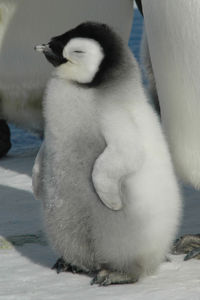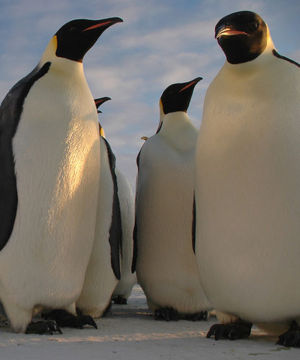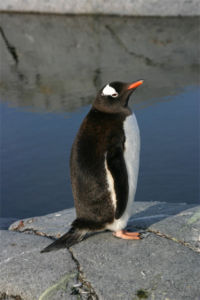Penguin: Difference between revisions
imported>John Stephenson m (Fixed reference) |
imported>Nancy Sculerati |
||
| Line 14: | Line 14: | ||
Penguins are subject to a substantial body of [[research]] work, as their [[health]] and survival rates could provide a good barometer for measuring [[climate change]] and how well they adapt to an [[Reaction of penguins to aircraft|increased human presence]] in their natural [[habitat]]. | Penguins are subject to a substantial body of [[research]] work, as their [[health]] and survival rates could provide a good barometer for measuring [[climate change]] and how well they adapt to an [[Reaction of penguins to aircraft|increased human presence]] in their natural [[habitat]]. | ||
==Origin of the word 'penguin'== | ==Origin of the word 'penguin'== | ||
Revision as of 09:04, 30 May 2007
Found almost exclusively in the southern hemisphere,[1] there are about 17 species of penguin. Adapted to harsh environments of barren land and cold water, these relatively large-bodied flightless birds are found from their southernmost range on Antarctica to north on the Galapagos Islands at the equator. All types of penguins share certain characteristics: they raise their young on shore and hunt underwater, and are marked with light and dark feathers. The best-known is probably the emperor penguin, which is also the largest of all the species.
Penguins are well-known worldwide for their apparently clumsy nature on land, where they can be observed waddling awkwardly in large colonies. All this changes, however, when penguins take to the water; with their wings adapted through evolution into fins, it is underwater that penguins 'fly'. This makes them superb divers, moving at speed through the frigid Antarctic Ocean or warmer waters further north.
Eggs

Penguins incubate their eggs using little or no nesting materials on the hard surfaces of their habitats. Especially thick eggshells apparently account for the rarity of prematurely broken penguin eggs. In Magellanic penguins (Spheniscus magellanicus), evidence shows that mollusk shells are preferentially eaten by females during the 'egg period', when shells are formed and eggs are laid.[2]
Predators
South polar skuas (Catharacta maccormicki) are important predators of Adelie penguin (Pygoscelis adeliae) chicks and eggs.
Penguins and climate change
Penguins are subject to a substantial body of research work, as their health and survival rates could provide a good barometer for measuring climate change and how well they adapt to an increased human presence in their natural habitat.
Origin of the word 'penguin'
The word penguin first indisputably appears in a letter of 1578 from Newfoundland; however, its true origins remain obscure. There are three main claims about its etymology in circulation, but no firm view; the following are the best known.[3]
One popular claim about the etymology of penguin is that it is from the Welsh pen gwyn, meaning 'white head'. This story relies on Celtic sailors in the northern hemisphere bestowing this name on the now-extinct Great Auk, a flightless bird unrelated to the Penguin but occasionally mistaken for it. Due to this confusion, penguin was later applied to penguins rather than auks. However, scholars have found fault with the idea that sailors from predominantly English-speaking regions would give the bird a Welsh name; indeed, the other name for the Great Auk, garefowl, is Norse, a language more usually associated with sailors of the North Atlantic. Not only that, but both penguins and great auks have rather more black than white on their heads (see photo). A further reason to dispute the Penguin's Welsh connections is that the sixteenth-century inhabitants of Newfoundland apparently referred to the Great Auk as 'Pin Wing', in reference to its rudimentary wings. This name supposedly spread to the penguins far to the south, though there is little firm evidence for this.
One other possible origin for penguin is from the Latin word for 'fat', pinguis - somehow, this word came to be applied to penguins in English, possibly through the legendary auk-penguin mix-up. This may be related to the fact that the Great Auk's Latin name is Pinguinus.[4] This story seems to exist simply because a Latin word happens to resemble the English penguin; no relationship has been established.
Footnotes
- ↑ But see penguins in the northern hemisphere.
- ↑ Dee Boersma et al. (2004).
- ↑ This section relies primarily on scholars from the Oxford English Dictionary. See Askoxford.com - ask the experts: 'What is the origin of the word 'penguin'?'. The Merriam-Webster Online Dictionary is another source, claiming that penguin is an old word for the Great Auk.
- ↑ Pingouin is the French word for an auk, rather than a penguin. French speakers name the penguin manochet. Confusingly, the villianous 'Penguin' character in the aforementioned Batman Returns film was named 'le Pingouin' in the French translation. As the Penguin's forces were composed entirely of penguins, rather than auks, it seems this confusion has entered even the francophone world.
References
- Dee Boersma P, Rebstock GA & Stokes DL (2004) 'Why penguin eggshells are thick.' The Auk: 121(1): 148-155. DOI: 10.1642/0004-8038(2004)121[0148:WPEAT]2.0.CO;2.

